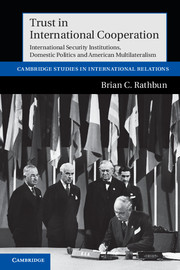 Trust in International Cooperation
Trust in International Cooperation Published online by Cambridge University Press: 05 June 2012
Generalized trust served as a crucial ingredient in the United States’ postwar program of multilateralism. It is necessary to explain many of the features of international security institutions, and the very creation of the organizations themselves. What does the social psychological argument offered in previous chapters have to tell us about American foreign policy today, particularly in light of the frequent declaration that the bipartisan pillar of multilateralism is now crumbling? In this chapter, I come full circle to consider the contemporary issues raised in this book's opening pages.
Just as many claimed that the lessons of WWII led to a fundamental shift in American foreign policy, some today argue that the terrorist attacks on New York and Washington led to a striking reorientation in America's approach to international relations. Most deftly, Hemmer (2007) argues that the “lessons of 9/11” are to remain hyper-vigilant to the possibility of terrorism and to disrupt and preempt attacks before they come to fruition. Crudely stated, 9/11 is the new Pearl Harbor. And just like that surprise attack, 9/11 is said to have led to a lasting structural shift in the political spectrum as a whole. Democrats and Republicans alike have committed to restrictions on civil liberties at home and to the war on terror abroad. Hemmer's claims bear a striking resemblance to those offered by Legro (2005) on how external events affected American grand strategy after Pearl Harbor and fostered the creation of a bipartisan consensus.
To save this book to your Kindle, first ensure [email protected] is added to your Approved Personal Document E-mail List under your Personal Document Settings on the Manage Your Content and Devices page of your Amazon account. Then enter the ‘name’ part of your Kindle email address below. Find out more about saving to your Kindle.
Note you can select to save to either the @free.kindle.com or @kindle.com variations. ‘@free.kindle.com’ emails are free but can only be saved to your device when it is connected to wi-fi. ‘@kindle.com’ emails can be delivered even when you are not connected to wi-fi, but note that service fees apply.
Find out more about the Kindle Personal Document Service.
To save content items to your account, please confirm that you agree to abide by our usage policies. If this is the first time you use this feature, you will be asked to authorise Cambridge Core to connect with your account. Find out more about saving content to Dropbox.
To save content items to your account, please confirm that you agree to abide by our usage policies. If this is the first time you use this feature, you will be asked to authorise Cambridge Core to connect with your account. Find out more about saving content to Google Drive.